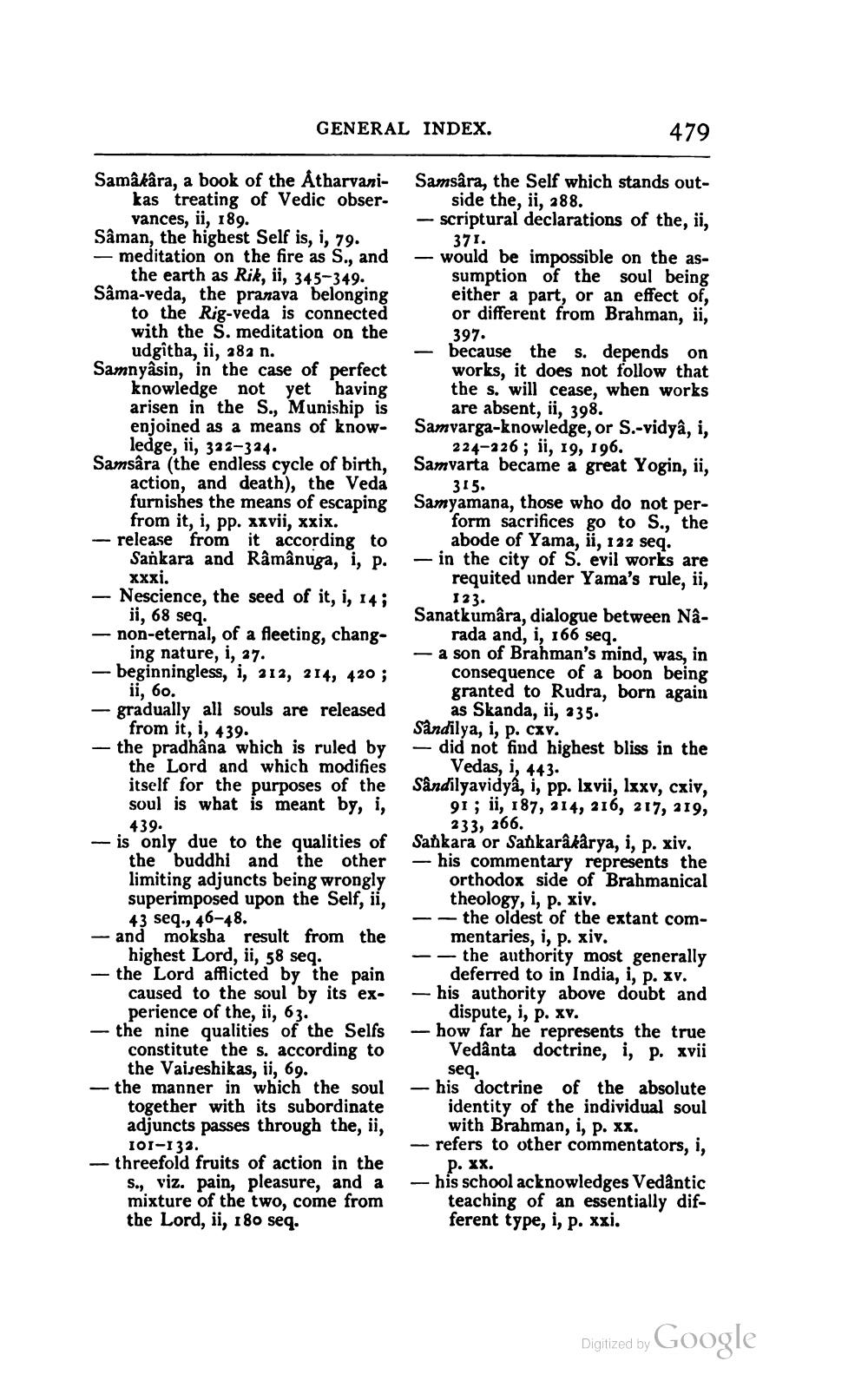________________
GENERAL INDEX.
479
Samâkâra, a book of the Åtharvani-
kas treating of Vedic obser
vances, ii, 189. Sâman, the highest Self is, i, 79. - meditation on the fire as S., and
the earth as Rik, ii, 345-349. Sâma-veda, the pranava belonging
to the Rig-veda is connected with the S. meditation on the
udgitha, ii, 282 n. Samnyâsin, in the case of perfect
knowledge not yet having arisen in the S., Muniship is enjoined as a means of know
ledge, ii, 322–324. Samsara (the endless cycle of birth,
action, and death), the Veda furnishes the means of escaping
from it, i, pp. xxvii, xxix. - release from it according to
Sankara and Râmânuga, i, p.
xxxi. - Nescience, the seed of it, i, 14;
ii, 68 seq. - non-eternal, of a fleeting, chang
ing nature, i, 27. - beginningless, i, 212, 214, 420;
ii, 6o. - gradually all souls are released
from it, i, 439. - the pradhấna which is ruled by
the Lord and which modifies itself for the purposes of the soul is what is meant by, i,
439. - is only due to the qualities of
the buddhi and the other limiting adjuncts being wrongly superimposed upon the Self, ii,
43 seq., 46-48. - and moksba result from the
highest Lord, ii, 58 seq. - the Lord afflicted by the pain
caused to the soul by its ex-
perience of the, ii, 63. -- the nine qualities of the Selfs
constitute the s. according to
the Vaiseshikas, ii, 69. - the manner in which the soul
together with its subordinate adjuncts passes through the, ii,
101-133. threefold fruits of action in the S., viz. pain, pleasure, and a mixture of the two, come from the Lord, ii, 180 seq.
Samsara, the Self which stands out
side the, ii, 288. - scriptural declarations of the, ii,
371. - would be impossible on the as
sumption of the soul being either a part, or an effect of, or different from Brahman, ii, 397. because the s. depends on works, it does not follow that the s. will cease, when works
are absent, ii, 398. Samvarga-knowledge, or S.-vidyâ, i,
224–226; ii, 19, 196. Samvarta became a great Yogin, ii,
315. Samyamana, those who do not per
form sacrifices go to S., the
abode of Yama, ii, 132 seq. - in the city of S. evil works are
requited under Yama's rule, ii,
123. Sanatkumara, dialogue between Nâ
rada and, i, 166 seq. - a son of Brahman's mind, was, in
consequence of a boon being granted to Rudra, born again
as Skanda, ii, 235. Sandilya, i, p. cxv. — did not find highest bliss in the
Vedas, i, 443. Sândilyavidya, i, pp. Ixvii, lxxv, cxiv,
91; ii, 187, 214, 216, 217, 219,
233, 266. Sankara or Sankarâkârya, i, p. xiv. – his commentary represents the
orthodox side of Brahmanical
theology, i, p. xiv. -- the oldest of the extant com
mentaries, i, p. xiv. -- the authority most generally
deferred to in India, i, p. xv. - his authority above doubt and
dispute, i, p. xv. - how far he represents the true
Vedanta doctrine, i, p. xvii
seg. - his doctrine of the absolute
identity of the individual soul
with Brahman, i, p. XX. - refers to other commentators, i,
P. XX. - his school acknowledges Vedântic
teaching of an essentially different type, i, p. xxi.
eshikas : ace the se
Digized by Google




